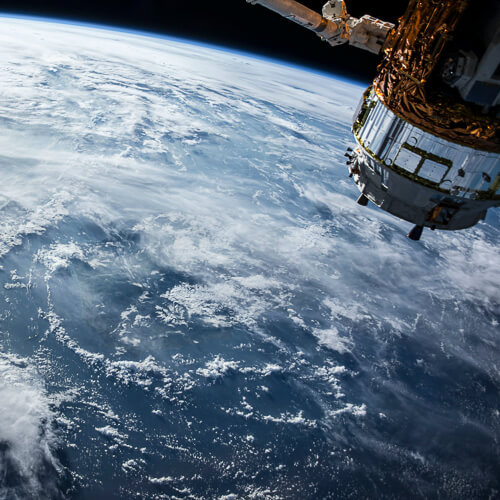
The news cycle in the satellite communications industry seems poised to hit ludicrous speed. While massive incumbents like SES and Intelsat reportedly discuss mergers, upstarts like SpaceX are looking for any advantage they can get. Meanwhile, startups ranging from Rivada to Sateliot to OQ Technology are seeking new funds to power their various space-based gambits.
The recent noise in the sector is partly due to the ongoing World Satellite Business Week trade show this week in Paris. But it also highlights the growing interest in how satellite communications might commingle communications networks on the ground, particularly cellular networks. Exactly how that might happen remains to be seen.
For example, startup Rivada hopes to put up to 600 low-Earth orbit (LEO) satellites into space in the coming years. But the company declined to say whether those satellites would feature the same kind of cellular capabilities that companies like SpaceX, Lynk and AST SpaceMobile have promised.
"Our goal is to facilitate the convergence of terrestrial and satellite communications, and move toward 'platform agnosticism' as it were – our customers should be able to buy connectivity when and where they need it, and worry a lot less about where it's coming from. We are exploring all options and speaking to a variety of industry players to achieve these goals," Rivada's Brian Carney wrote in response to questions from Light Reading on the topic.
Figure 1:  (Source: NASA)
(Source: NASA)
Thus, here are some of the big developments in the satellite communications industry in just the past few days:
LEO upstart OneWeb took a $229 million charge this year due to its shift away from business with Russian companies following Russia's invasion of Ukraine. OneWeb also reported just $9.6 million in revenue from the year on a net loss of $389.8 million.
Chinese satellite Internet startup GalaxySpace announced new funding that gives the company a whopping $1.58 billion valuation. The company earlier this year launched LEO satellites to test 5G-based services.
Spanish startup Sateliot said it has opened a $10.1 million convertible note to finance the deployment of its planned LEO satellite constellation. The company hopes to provide NB-IoT services from its satellites, thereby connecting to unmodified cellular devices that support the standard that are on the ground.
Aalyria, Google's latest spinout, emerged from stealth mode Monday, according to CNBC. The company hopes to "radically" improve satellite communications with laser technology.
Luxembourg startup OQ Technology said it raised around $13 million for its own satellite constellation for Internet of Things (IoT) devices. Saudi oil and gas company Aramco's venture capital arm, alongside a fund managed by 5G Ventures, led the funding.
Startup AST SpaceMobile said it successfully launched its new BlueWalker 3 prototype satellite. The company hopes to begin testing phone-to-satellite communications in the next few months.
As noted by SpaceNews, hanging over these developments are hints of broader consolidation in the satellite communications industry. Already Eutelsat and OneWeb have announced their plans to combine, as have Viasat and Inmarsat.
Meanwhile, SES and Intelsat are reportedly mulling over their own merger, though neither is commenting on that situation.
Such developments indicate "that a shift from video to data use-cases is well underway" in the satellite industry, analyst Brad Grady, with Northern Sky Research, told SpaceNews.
But regulatory issues continue to play an outsized role in the development of the sector. For example, SpaceX on Friday challenged the FCC's decision to reject its application for almost $900 million in government subsidies. The company called the FCC's move "flawed" and "grossly unfair."
But some analysts don't believe SpaceX will successfully overturn the FCC's ruling.
"While the Republican Commissioners probably agree with SpaceX, the [FCC] chair controls the timing and is not obligated to bring the question to a vote," wrote the financial analysts at New Street Research in a recent note to investors. "Further, it would require a majority to overturn it, which Republicans are unlikely to have [at the FCC] for several years at least."
The analysts also suggested that any court challenge would likely be made moot by billions of dollars in state funding for the digital divide, which is scheduled to be released in the coming years.
Finally, FCC Chairwoman Jessica Rosenworcel also recently proposed new rules that would require LEO satellite operators to dispose of their satellites within five years of completing their missions, rather than the current 25-year guideline.
"Our space economy is moving fast. For it to continue to grow, we need to do more to clean up after ourselves so space innovation can continue to expand," Rosenworcel said in a statement.
Related posts:
— Mike Dano, Editorial Director, 5G & Mobile Strategies, Light Reading | @mikeddano
About the Author(s)
You May Also Like












